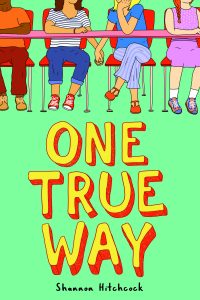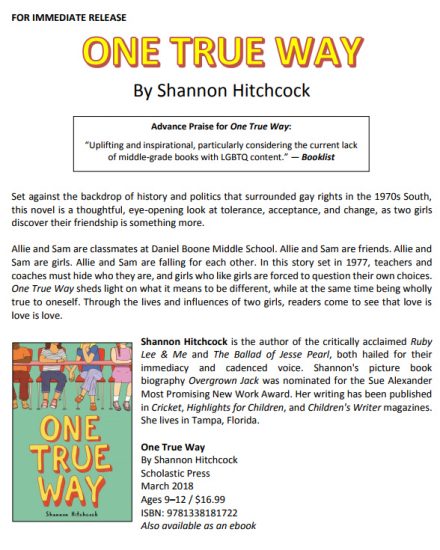
- Home
- Books
- Bio
- Author Visits
- For Teachers
- For Press
- For the Press Of Words & Water
- For the Press Dancing in the Storm
- For the Press Story Quilts
- For the Press She Sang for the Mountains
- For the Press Saving Granddaddy’s Stories
- For the Press – Flying Over Water
- For The Press – One True Way
- For the Press – Ruby Lee & Me
- For the Press – The Ballad of Jessie Pearl
- Press Release ONE TRUE WAY
- Media Release – The Ballad of Jessie Pearl
- BLOG
- Store
- Contact
One True Way
Welcome to Daniel Boone Middle School in the 1970s, where teachers and coaches must hide who they are, and girls who like girls are forced to question their own choices. Presented in the voice of a premier storyteller, One True Way sheds exquisite light on what it means to be different, while at the same time being wholly true to oneself. Through the lives and influences of two girls, readers come to see that love is love is love. Set against the backdrop of history and politics that surrounded gay rights in the 1970s South, this novel is a thoughtful, eye-opening look at tolerance, acceptance, and change, and will widen the hearts of all readers.
Praise for One True Way.
Allie’s levelheaded narration is refreshingly nuanced. Hitchcock unflinchingly characterizes the emotional struggles of being young and lesbian… Throughout, Allie asks ‘hard questions’ about whether homosexuality is right in the eyes of the Bible or her community. Ultimately and affirmingly, her adult role models encourage her to be true to herself. A compelling and honest addition to the few existing stories about gay middle schoolers.
Kirkus Reviews, starred reviews
Shannon Hitchcock’s important story shines a bright light on the struggles that LGBT kids had to deal with in the mid-1970s, giving us a context with which to understand more fully the same struggles that are happening today. In straightforward prose, this honest look shows us how far we’ve come, and at the same time doesn’t deny how far we have to go.
Kathi Appelt, National Book Award Finalist and Newbery Honor-winning author of The Underneath
Hitchcock—The Ballad of Jessie Pearl (2013) and Ruby Lee & Me (2016)—is no stranger to writing about the tumultuous lives of young people. Reminiscent of Nancy Garden’s Annie on My Mind (1982), Hitchcock’s novel follows Allie and Samantha as they navigate a newfound friendship and slowly budding romance against the backdrop of religious intolerance, family discord, and school drama—complete with a
plethora of ’70s pop culture references. Religion bumps up against self-discovery and early romantic fulfillment, but with an accepting minister and supportive friends, both Allie and Sam work to understand their place in the rural South. The story explores the delicate dance of coming out at a young age, and while the book is reminiscent of early LGBTQ fiction for young readers—family strife, alienation, quickly wrapped-up endings, and so on—the 1970s time frame provides something of a justification for the southern attitudes. Young readers will find this novel to be ultimately uplifting and inspirational,
particularly considering the current lack of middle-grade books with LGBTQ content.Rob Bittner, Booklist
Shannon Hitchcock brings a light touch to a very complex era in history, revealing how the “one true way” is the path to unconditional love for two girls. A brilliant and powerful story!
Gayle Pitman, Stonewall Award-winning author of This Day in June





